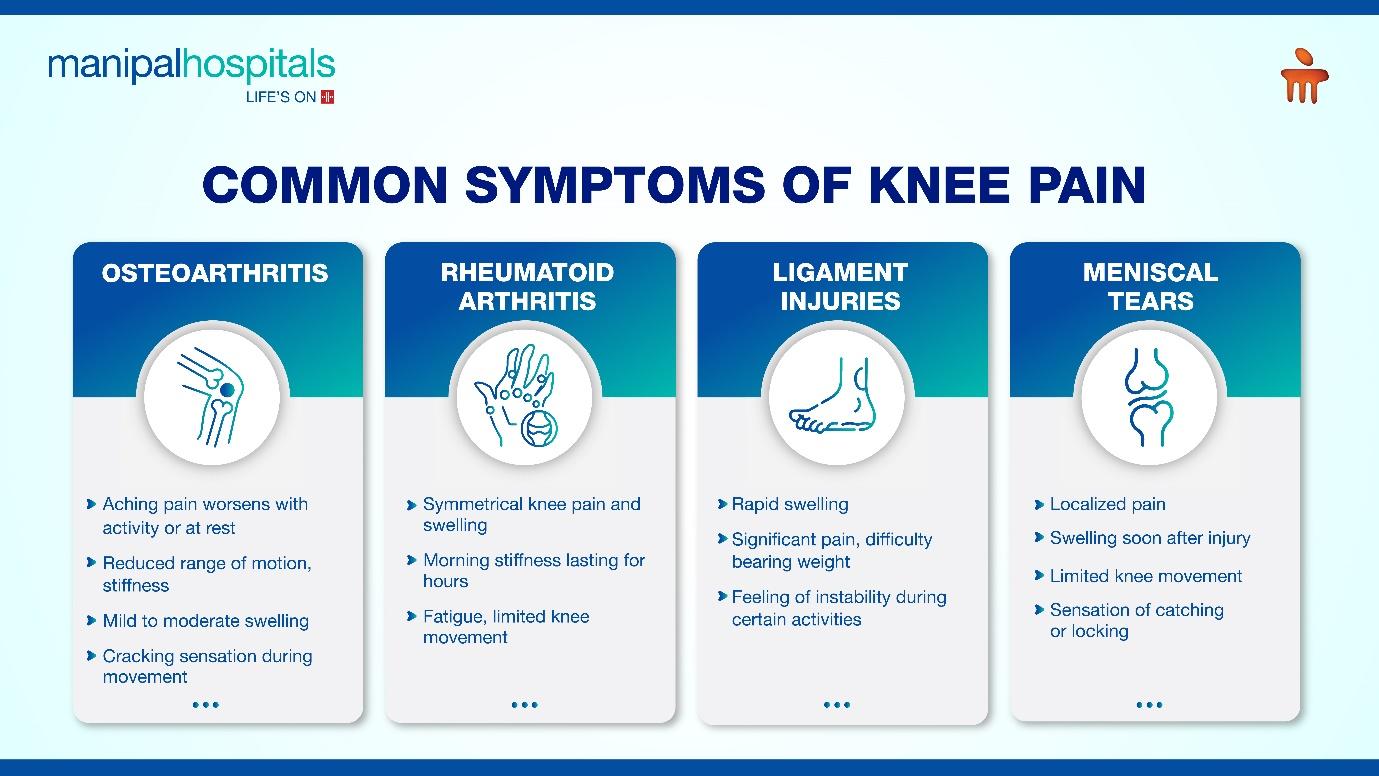
Knee pain, a prevalent complaint across all age groups, can significantly hinder daily activities and quality of life. This intricate joint, responsible for bearing our body weight and facilitating movement, is susceptible to various issues leading to discomfort and pain. Therefore, it has become essential to explore knee pain treatment options and knee pain remedies. Additionally, consulting an Orthopaedician for accurate diagnosis and tailored advice is crucial.
Osteoarthritis
Osteoarthritis, the most common form of arthritis, primarily affects the elderly population. This degenerative joint disease occurs when the protective cartilage that cushions the ends of bones deteriorates over time, leading to pain, stiffness, and limited mobility. Those experiencing osteoarthritis-related knee pain may notice discomfort after prolonged periods of inactivity or during weight-bearing activities. Swelling and a grating sensation within the joint, are also indicative of this condition. X-rays and physical examinations are often utilised to diagnose osteoarthritis.
Symptoms of Osteoarthritis
- Pain: Dull, aching pain that worsens with activity and might even occur at rest.
- Stiffness: Decreased range of motion and difficulty in bending or straightening the knee.
- Swelling: Mild to moderate swelling around the knee joint.
- Crepitus: Cracking or grating sensation during knee movement.

Rheumatoid Arthritis
Unlike osteoarthritis, rheumatoid arthritis is an autoimmune disorder that can affect individuals of any age. This condition occurs when the immune system mistakenly attacks the synovium, the lining of the membranes that surround joints. Inflamed synovium leads to pain, swelling, and potential damage to joint components. Symptoms of knee sprain caused by rheumatoid arthritis tend to be symmetrical, affecting both knees simultaneously. Morning stiffness that lasts for more than an hour and flu-like fatigue are common early symptoms. Diagnosing rheumatoid arthritis involves clinical evaluation, blood tests, and imaging studies.
Symptoms of Rheumatoid Arthritis
- Pain: symmetrical knee pain and swelling due to immune-driven synovial inflammation.
- Stiffness: Morning stiffness lasting over an hour, fatigue and limited knee movement.
- Swelling: Symmetrical knee pain and swelling due to immune-driven synovial inflammation.
Ligament Injuries
The knee is stabilized by four main ligaments: the anterior cruciate ligament (ACL), posterior cruciate ligament (PCL), medial collateral ligament (MCL), and lateral collateral ligament (LCL). Injuries to these ligaments often result from sudden movements or trauma. An ACL tear, commonly experienced during sports activities, causes a popping sensation, rapid swelling, and difficulty in walking. PCL injuries are less frequent and lead to deep pain in the back of the knee. MCL and LCL injuries result in pain and instability on the inner or outer side of the knee, respectively. Diagnosis of ligament injuries includes a physical examination, imaging, and possibly an MRI. Ignoring a ligament injury can lead to early wear & tear of the Joint resulting in Osteoarthritis.
Symptoms of Ligament Injuries
- Immediate Swelling: Rapid swelling within a few hours of the injury.
- Pain: Significant pain, often making weight-bearing difficulties.
- The sensation of giving away while climbing / Getting downstairs / Brisk walking
Meniscal Tears
The meniscus, a wedge-shaped piece of cartilage in the knee, acts as a shock absorber and provides stability. Meniscal tears often occur due to twisting motions during activities such as sports or heavy lifting. Symptoms include pain, swelling, and a feeling of the knee "locking" or "catching" during movement. Diagnosis involves a combination of clinical assessment and imaging techniques like MRI.
Symptoms of Meniscal Tears
- Pain: Localised pain along the side or centre of the knee.
- Swelling: Swelling might occur within a few hours of the injury.
- Limited Range of Motion: Difficulty in completely bending or straightening the knee.
- Catching or Locking: Sensation of the knee catching or locking during movement.
Knee pain is a multifaceted issue that can stem from various underlying causes. Osteoarthritis, rheumatoid arthritis, ligament injuries, meniscal tears and patellofemoral pain syndrome are among the common culprits contributing to discomfort and limited mobility. Recognising the symptoms associated with each condition is the first step towards seeking appropriate medical attention. It is important to undergo proper diagnosis and tailored treatment plans are vital for effectively managing knee pain and improving overall quality of life.
If you're experiencing persistent knee pain, consult the top healthcare professional in Vijayawada to determine the most suitable course of action.
FAQ's
Osteoarthritis, rheumatoid arthritis, ligament injuries, meniscal tears, and patellofemoral pain syndrome are some of the most common causes of knee pain.
Symptoms may vary depending on the underlying cause and severity, some of the common ones include pain, stiffness, swelling, crepitus (grating sensation), limited range of motion, and instability.
Consult a doctor if your knee pain is severe, persistent interferes with daily activities, causes swelling or instability, or results from a recent injury.
Maintaining a healthy weight, exercising regularly, strengthening the muscles around your knee, and using proper form during activities can help prevent knee pain.



















 4 Min Read
4 Min Read









.png)





